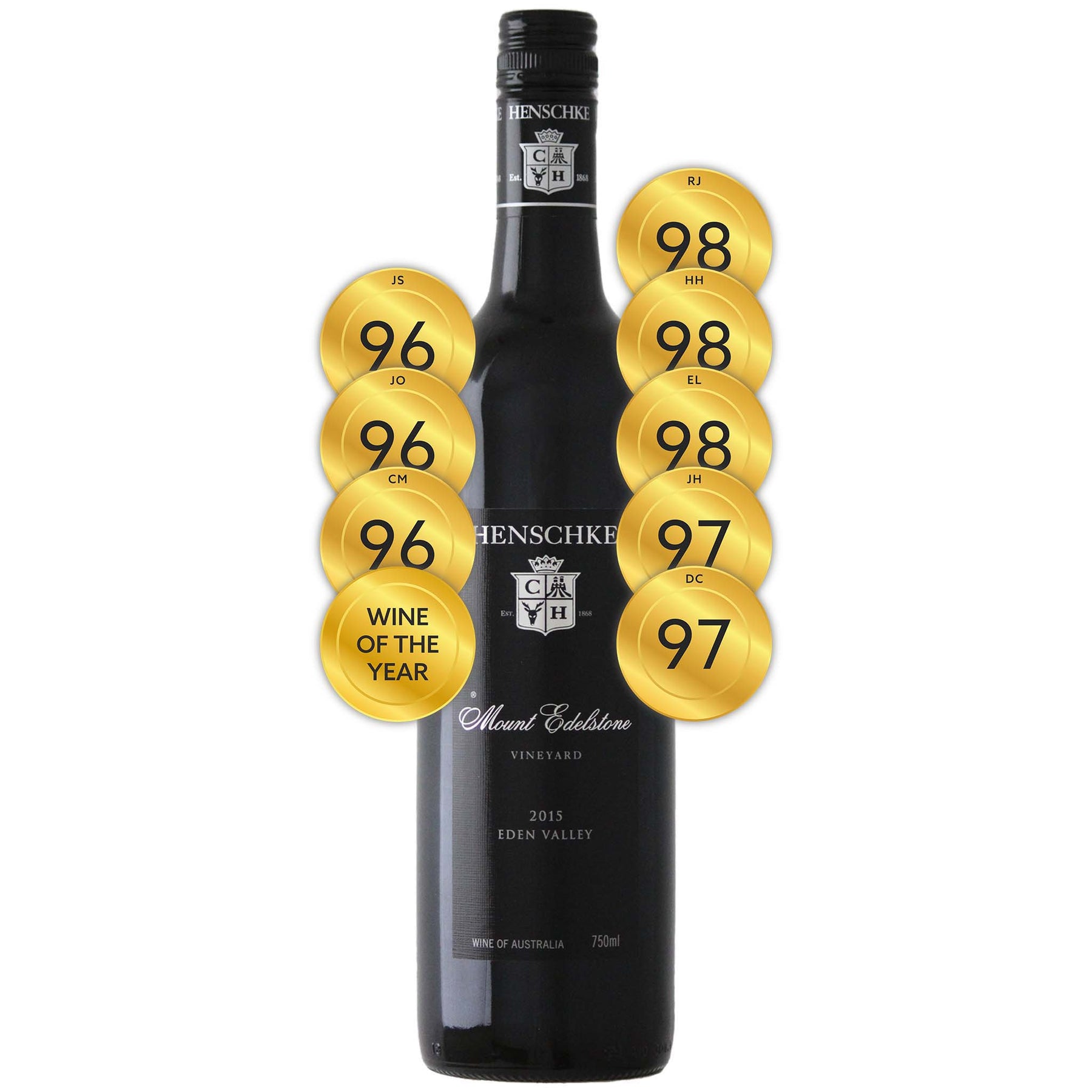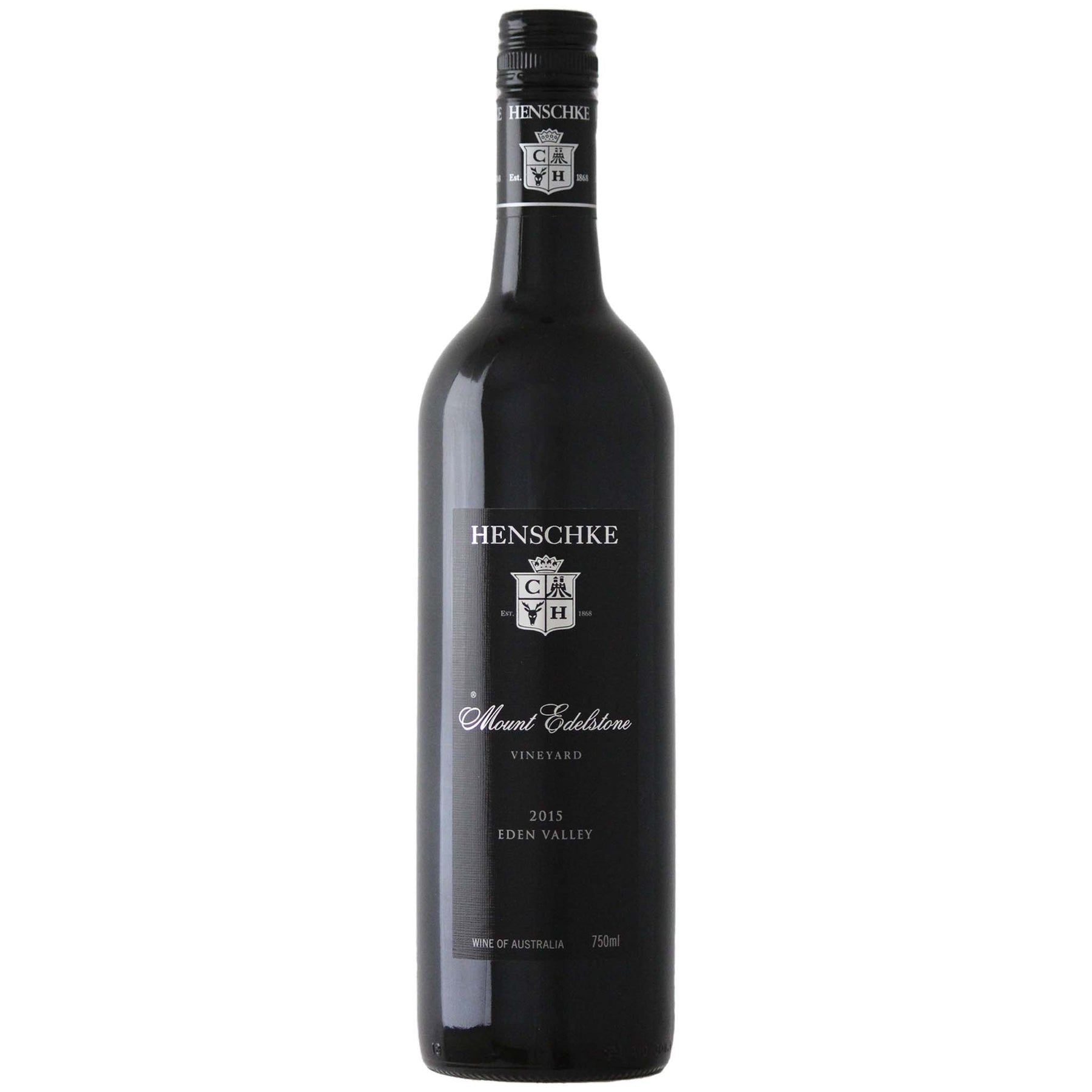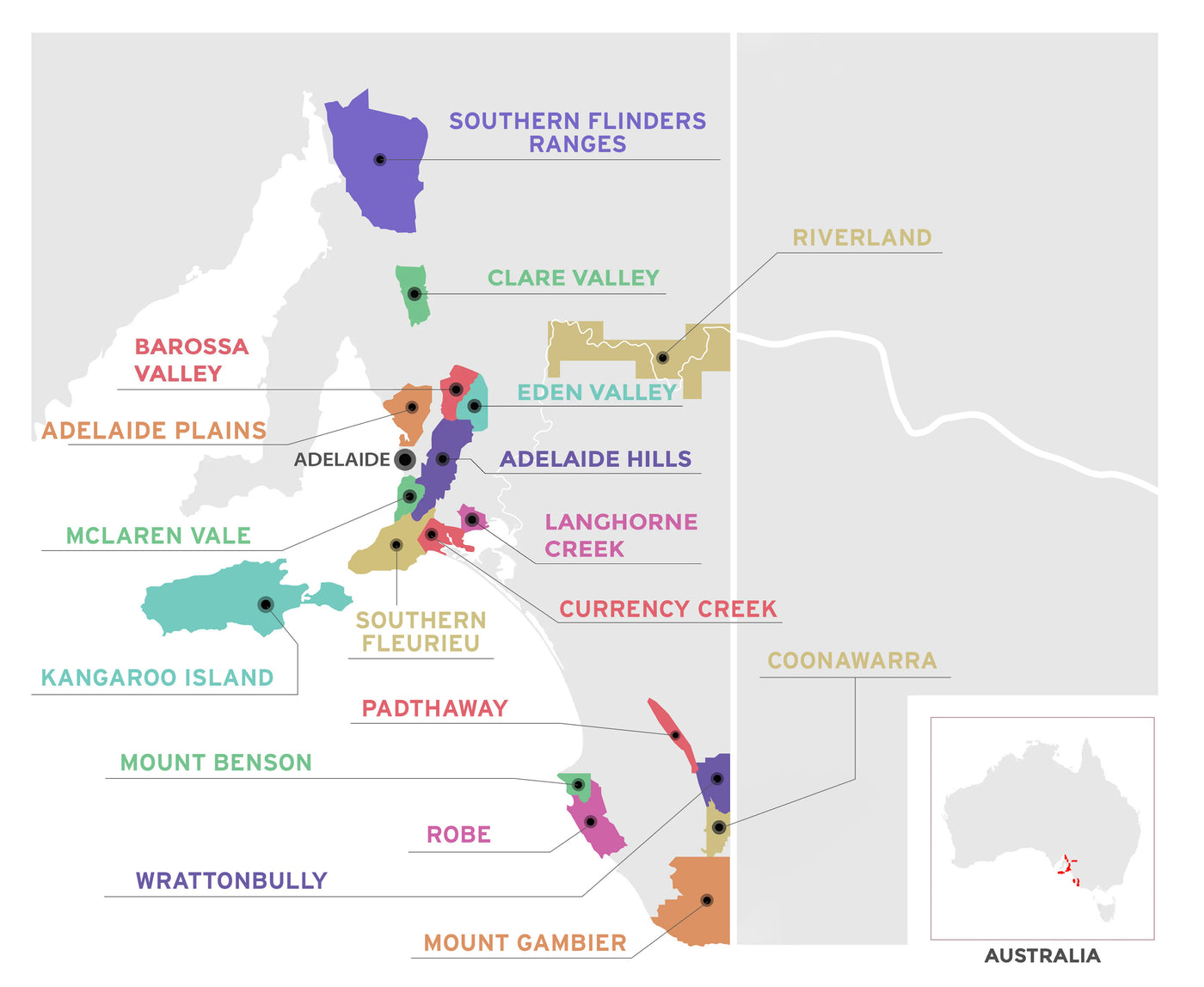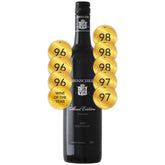

Henschke Mount Edelstone Shiraz 2015
Style: Red Wine
Variety: Shiraz
Closure: Screwcap
Henschke Mount Edelstone Shiraz 2015
Warehouse
34 Redland Drive
Vermont VIC 3133
Australia
Critic Score: 98
Alcohol: 14.5%
Size: 750 ml
Drink by: 2047
Decanter Magazine Australian Red Wine of the Year 2020
Mount Edelstone Shiraz is one of Australia's most famous single vineyard shiraz and a national treasure. The famed Mount Edelstone Vineyard, located in the Eden Valley at an altitude of 400 metres, is planted to dry-grown ungrafted centenarian vines which were sourced from pre-phylloxera material. The oldest vines were planted in 1912.
The first vintage of Mount Edelstone was bottled by Cyril Henschke in 1952. This 2015 vintage release is the 63rd vintage crafted by the Henschke family, believed to be the longest consecutively-produced, single-vineyard wine in Australia.
"The vintage was excellent, the flavours deep, with soft blackberry and plum fruits wending their way across the palate, cushioned by cedary oak and carefully polished tannins. It's utterly classic drinking, with unalloyed pleasure now but no less in another 20 years." James Halliday
Fifth-generation winemaker Stephen and his viticulturist wife Prue, who have been at the helm at Henschke since the early 1980s, have taken the quality of this iconic wine to the next level. This highly regarded team, who lead the way in environmental, biodynamic and organic practices, have won multitude awards that recognise the complementary nature of their roles.
"Very deep crimson in colour. Definitive Mount Edelstone shiraz aromas of sage and crushed black pepper lead to brightly spiced plum, blue and black berry characters, enveloped by crushed flowering herbs with cedar nuances. Vibrant, wild forest berries are layered beautifully into a rich and elegantly textured palate with fine velvety tannins and lingering notes of black pepper and sage for an extremely long finish. Matured in 78% French and 22% American (22% new, 78% seasoned) hogsheads for 18 months prior to blending and bottling." Henschke (Nov 2018)
Expert reviews
"Deepish red colour with just a trace of purple in its rim, the bouquet is pungent raspberry, squashed overripe raspberry, classic Mt Edelstone. The wine is succulently fruit-sweet: gorgeously extravagant fruit floods the palate. It's almost jammy, the fine but persistent tannins just pulling it together on the finish so the aftertaste and follow-through are clean and balanced and refreshing. Lush fruit flavour, astonishing texture, very old-viney, a very impressive Edelstone. A stand-out vintage for this wine. Drink: 2019-2040." Huon Hooke, The Real Review - 98 points (tasted Apr 2019)
"Great wine - a multitude of dried herb scents, crushed raspberries, thyme and sage. Tremendous complexity. Gorgeous silky texture. Extravagant fruit flavor. Wonderful drinking already but it has a very long future ahead. A great vintage for this wine. Drink: 2020-2040." Huon Hooke, The Real Review - 98 points (tasted Sep 2020)
"Single Vineyard Shiraz. Planted in 1912. Bottled as a single vineyard wine from the 1952 vintage onwards. This is salted black liquorice (the Dutch cat kind) grilled raspberry, blueberry, and mulberry. The palate is deep and saturating and for all of its opulence and stature, maintains restraint and finesse. The tannins make only a gentle impact on the palate, while they are omnipresent they are not overbearing and serve to bolster and support the fruit and spice. The length is incredibly long, leaving a lingering, beckoning impression on the palate. There is a saltiness and a moorishness here that is impossible to leave alone… the wine begs to be consumed, quietly cheering you on to do so from the glass. Delicious, exciting, classy and speaks clearly of it Eden Valley roots. Makes me want to drink a lot, lot more of this." Erin Larkin – 98 points
"This comes from a biodynamically farmed vineyard now more than 100 years old. In keeping with the vintage, it is more restrained and less opulent than the 2014, yet there's an elegance and poise. Typical vineyard characters of sage and bay leaf, with a sprinkle of pepper." Ray Jordan – 98 points
"Outstanding old-vine Shiraz doesn't need to shout to be heard. From the 103-year-old Mount Edelstone Vineyard, this opens to a mild, measured nose of vibrant red fruits, then a highly strung palate of redcurrant, plum, raspberry and blueberry with liquorice and wild fennel peeking beneath. A very bright, high-acid line keeps the flavours sharply honed, ensuring the slender palate line remains taut and prim. An earthy foil chimes in on the long finish." Decanter - 97 points and Australian Red Wine of the Year 2020
"This was the first wine sold in bottle ('52) by Henschke, although it has had to play second fiddle to Hill of Grace since '58 when the latter came on stream. New oak is only 22%, and the majority of the oak is French. The vintage was excellent, the flavours deep, with soft blackberry and plum fruits wending their way across the palate, cushioned by cedary oak and carefully polished tannins. It's utterly classic drinking, with unalloyed pleasure now but no less in another 20 years. Price: $225.00; Alcohol: 14.5%. Drink by: 2047." James Halliday, Halliday Wine Companion - 97 points
"A very profound sage note here with wild brambleberries, bay leaf and subtle oak influence, cast across a green-peppercorn and mint-tea nuance with such bright red berries and plums. The palate has a super plush and elegant shape and fine, velvety-tannin texture with plush, long red plums. Such poise and elegance with length and concentration here. An exceptional vintage for Mount Edelstone." James Suckling – 96 points
"Distinctive aromatics. Leathery, almost gamey, with potpourri and roasted plums, blackberry, bay and clove flavours. It's both soft and zesty, beety and earthen, but also sweet and floral. You get an array. You get an experience. It's so different to the Hill of Roses, but obviously no lesser. Life. It tastes like a life well lived, or an expression of that, though it's certainly a wine of vigor. As you drink it the words classic lands in your mind. Tasted: May 19 Alcohol: 14.5% Price: $225 Closure: Screwcap Drink: 2022 - 2040+." Campbell Mattinson, The Wine Front - 96 points
"Profoundly floral, spicy and incredibly youthful, with a confiture-like bouquet of raspberries, strawberries, redcurrants and blueberries knit with cedar/vanilla oak and backed by a hint of coconut ice. Medium to fullish in weight, it's remarkably long and elegant, with a vivacious expression of small berry flavours knit with dusty, cedary oak and a drying, faintly chalky spine. From a cooler season, there's a suggestion of dried herbs and a balance that suggests genuine longevity." Jeremy Oliver – 96 points
"A wine of grace and power, with the hallmark being its supple, velvety palate. The fruit flavours are intense, yet refined, with a mix of red, blue and dark berries plus hints of herb and crushed lemon-leaf. The tannins melt into the body of the wine, and the flavours are long and satisfying. It is a wine that is drinking beautifully now, though its ageing potential is undeniable." Toni Paterson MW – 96 points
"From one of South Australia's most historic vineyards (planted in 1912 and bottled as a single-vineyard wine since 1952), Henschke's Shiraz ripples with flavor, texture and length. Sun-puckered plum and cherry, milky coffee with cocoa powder, ground pepper, beet, baking spices and warm stone all roll over the senses. Powdery, spicy tannins juxtapose the juicy, silky fruit. Drinking nicely now but should cellar beautifully for 20 years or more." Christina Pickard, Wine Enthusiast – 96 points
"Signature dried sage and complex herb and scrub (bush) notes – strands of eucalyptus and minty pepper tree – leap out of the glass. A spicy hum of black pepper and lifted, floral pink peppercorn emerges with time in glass. Evocative scents, which transport me directly to Australia. A vineyard visit on a sunny day, the bush tinder-dry, the earth warm. Suffusing the spice and herb-riven palate, intense, yet delicate, dancing from tip to toe, they bring piquant complexity, warmth and a (gently menthol) coolness going through and on the ethereal, exceptionally lingering finish. The interplay – the dance, or tension – between the tannin and acid is similarly insistent, but gentle, allowing the fruit to steal over the palate pure and untroubled, without a hair out of place. Juicy bramble, blackberry, earthy raspberry and, on day three, sweet strawberry and plum, is buoyed by fresh mineral acidity, with an ironstone tang. The tannins are fine-grained and mineral (rather than oaky, though I pick up cinnamon on day 2 and subtle milk chocolate). Very much in tune with our times, this is a Shiraz of fine filigree. Wonderfully expressive already, I must admit I would find this truly outstanding Shiraz hard to resist, but the Henschkes expect it to age for 30 years plus." Sarah Ahmed, The Wine Detective
Awards
Decanter Magazine Australian Red Wine of the Year 2020
Mount edelstone

The Mount Edelstone Vineyard is located in the Eden Valley wine region, 4km west of Henschke Cellars at Keyneton, in the Mt Lofty Ranges. The vineyard lies at the foot of a small hill or 'mount' originally given the name 'Edelstein' by a German surveyor back in 1839. Mount Edelstone is a translation from the German Edelstein meaning gemstone, a reference to small yellow opals once found in the area.
The vineyard is planted to own-rooted shiraz, with the oldest vines planted in 1912 by Ronald Angas, a descendant of George Fife Angas, who founded The South Australian Company and played a significant part in the formation and establishment of South Australia. These dry-grown ungrafted centenarian vines were sourced from pre-phylloxera material from Joseph Gilbert's nursery; believed to originate from James Busby's selection. The vineyard lies at an altitude of 400 metres and the ancient 500 million-year-old soils consist of deep sandy loam over gravelly medium-red clay, overlying laminated siltstone.
From the early 1950s onwards, Colin Angas, the son of Ronald Angas, offered the grapes from the Mount Edelstone Vineyard to fourth-generation Cyril Henschke. The first Mount Edelstone bottled as an individual vineyard wine was the 1952 vintage. It was simply labelled as Mount Edelstone Claret bottled by C A Henschke & Co, North Rhine Winery, Keyneton, South Australia. The back label read, "This wine is made from shiraz grapes grown at Mount Edelstone Vineyard, Keyneton".
The 1956 vintage won First Prize in Adelaide, Sydney and Melbourne. It stormed the national wine show circuit and announced its formidable presence at the forefront of the pioneering days of Australian red wine.
Cyril Henschke purchased the vineyard from Colin Angas in 1974, by which time Mount Edelstone was already well entrenched as one of Australia's greatest shiraz wines. Crafted by the Henschke family for 66 years now, Mount Edelstone is arguably the longest consecutively-produced, single-vineyard wine in Australia.
The Mount Edelstone Vineyard today
The vines are planted on their own roots, are dry grown and yield an average of 3 t/ha (1.25 t/acre). The vines are planted on a wide spacing of 3.7m between vines and 3.7m between rows. The original one-metre trellis consists of two wires which carry two to three arched canes with a bud number of around 50 to 60. The foliage is allowed to hang down to form a drooping canopy, which helps to reduce shoot vigour.
In 1989 Prue trialled 10 rows of a Scott Henry trellis in which the shoots from the top wire canes are trained upwards between foliage wires and the shoots from the bottom wire canes are trained downwards between foliage wires. The effect of this solar panel system is to provide a significant increase in exposure of the leaves and fruit to the sun, thereby increasing fruitfulness and promoting earlier ripening and a greater increase in colour and flavour of the fruit and improved tannin maturity.
This trellis has had such a positive impact on the quality of the wine that over three quarters of the vineyard has now been converted to it. Other trellis trials were also being evaluated including VSP (Vertical Shoot Positioned), high single wire, Smart Dyson and ballerina.
The Mount Edelstone vineyard is underlain entirely by laminated siltstones of the Tapley Hill Formation. The soils are fine sandy loams over deep gravelly medium red clays. The soil layer goes to a significant depth before reaching the bedrock. The pale mottled clay/clay loam layer indicates that a large degree of leaching and periodic waterlogging has occurred. Rocks beneath the red clay soils are schists of Cambrian age. These are metamorphosed mineral-rich sediments, originally deposited in a shallow sea, then deeply buried, and finally pushed back up to the surface where they weathered to produce a thick soil layer.
Originally the ground was cultivated for weed control. Nowadays the vineyard has a permanent sward including native grasses. A mulch of wheat straw is used under the vines to retain soil moisture, build up organic matter, and inhibit weed growth. Prediction of disease pressure through an integrated pest management program results in minimal chemical input in the vineyard. The vineyard management incorporates organic and biodynamic practices, including composted grape marc, cow pit peat, 500 and 501 preparations, milk whey and bicarbonate sprays.
The grapes are picked mid to late April at a sugar level of around 24°Bé. There is always a remarkable acid/pH balance from this vineyard. The anthocyanins in the berries are very high which indicates the superior quality of the Mount Edelstone shiraz.
Prue began a mass selection program in 1986 to identify the best vines for propagation. With her assistant Uschi Linssen she tagged and mapped selected vines in the vineyard for viticultural features during the growing season using criteria such as even budburst, absence of the wood-rotting fungus eutypa, bunch numbers per shoot, the evenness of flowering and veraison, virus, and maturity and colour figures in the fruit. It was painstaking work, which also included a similar selection of the Hill of Grace vineyard.
Cuttings from the selected vines were planted in the nursery. The research work is ongoing and is a scientific program that has taken up to 30 years to work through. Cuttings have been taken from the nursery vines, propagated, and planted as needed in the vineyard to replace old vines that have expired from dying arm, Eutypa lata.
Stephen & Prue
Winemaker Stephen Henschke, fifth-generation family member and youngest son of Cyril Henschke, showed great interest in science and winemaking at an early age. With a wonderful family heritage of more than 140 years of grape growing and winemaking spanning five generations, this came as no surprise. He is proud that the Henschke name and reputation is inexorably linked with red wines in general and Hill of Grace in particular, but with winemaking in his lifeblood, he approaches all wine styles with the same depth of passion and commitment to quality.
Stephen has retained the traditional approach to red winemaking used by his forebears. They handled the wines gently, used minimal racking, low sulphur, and gentle fining and filtration. They took a puristic, holistic approach that had been passed down from generation to generation so his winemaking techniques are almost intuitive. He keeps intervention to a minimum, favouring gentle extraction of his reds so as to retain freshness and subtlety, and applies Old World techniques to his New World white grapes for elegance and texture. At the ‘50 Years of Hill of Grace' celebration in 2008 when Stephen tasted every vintage – some for the first time – he was struck by how closely he was emulating his father's winemaking of the late 1950s and the 60s with his minimal intervention techniques.
Stephen is also mindful of his European roots and is a proud supporter of the historical language, food, religion and wine culture of his Silesian forebears still alive in pockets in the Barossa.
Stephen's support and contribution to the Barossa was acknowledged in 1984 when he was inducted into the Barons of Barossa wine fraternity, of which his father Cyril was a founding member.

Viticulturist, botanist and environmentalist Prue Henschke manages their 105 hectares of vineyards in the Eden Valley and Adelaide Hills. With today's advanced viticultural practices, the greatest focus at Henschke is given to the quality of fruit in the vineyard. The increase in quality of both the red and white wines, which has helped take this iconic wine brand to the next level, is largely attributed to the increase in fruit quality.
Although Prue didn't set out to work in the wine business, she has become a key figure in the evolution of Australian viticulture and wine. She has a commitment to restoring balance to the natural environment, minimising harmful impacts and to regenerating the Henschke vineyard ecosystems. This has seen her win numerous local and international awards.
Prue became part of the Henschke world when she married Stephen, a fifth-generation Henschke. And for over 30 years, she has been a true pioneer. Her influence in the vineyards has been a balancing act of respecting tradition and protecting history while making bold decisions to innovate and improve. She restructured the vineyards, introduced new trellis types and transformed soil management using composts and mulches, which has led to adoption of organic and biodynamic practices.
How has Prue managed to blaze new trails among precious, historic vineyards. It all comes down to science. Science is the link between the vines and the quality of the wines that come from it. And it's how Prue's world collided with the Henschke dynasty. Her early interest in science led her to study botany and zoology at Adelaide University in the early 1970s. There she met Stephen, a fellow science student. After graduating, the pair headed to Germany for two years, where Prue became involved in viticulture and plant physiology. She worked at the Geisenheim Institute Vineyards and volunteered on a project in the Botanic Institute at Geisenheim – an experience that sparked a lifelong passion and set her on the path to becoming a leading viticulturist.
After returning to Australia and studying Wine Science alongside Stephen, Prue gained more experience in viticultural research, before becoming a viticultural consultant. In 1980 she started working with Stephen, who had taken over as winemaker at Henschke. They bought an apple orchard in the Adelaide Hills, near where the very first Henschke vineyard had been planted in 1862, and converted it to a vineyard, creating a ‘living research station' where they experimented and tested theories on cool-climate viticulture. This revolutionary research became vital in growing and improving cool-climate wine production in Australia.
In 1987, Prue took on her current role at Henschke. She not only manages over 100 hectares of vineyards but is custodian of precious old vines, some of which have been in the earth since the first days of the family estate.
Prue represents the pinnacle of viticulture in Australia. Her influence has reached cool-climate vineyards across the country, and in 2016 she was named Viticulturist of the Year at the Australian Women in Wine Awards. She is a highly respected voice in the Australian wine community and a strong campaigner for environmental issues. Prue is passionate about protecting the natural environment while growing grapes good enough to create Australia's best wine. And Henschke wines have never been better.
Reference material taken from: https://www.australianwine.com/en-AU/our-makers/prue-henschke
The winery

Henschke is the best medium-sized red wine producer in Australia and is recognised as one of the world's great wine labels. It is home to Australia's most famous vineyard, the majestic Hill of Grace, which produces Australia's greatest single vineyard wine. Outstanding Shiraz, cabernet sauvignon and Rieslings are produced by the fifth and sixth generations of winemakers, with a focus on single-site expressions that tell the story of the land and the people that made them.
The Henschke family has been making wine since Johann Christian Henschke planted a small vineyard on his farming property at Keyneton in 1862. He was one of many Silesians who had fled their homeland in search of religious freedom. Johann Christian built a small two-storey cellar into the side of the hill and the first vintages of riesling and shiraz were released in 1868.
Each generation has built upon the foundations of Henschke. In more recent times, fourth-generation Cyril Henschke pioneered varietal and single-vineyard wines at a time when blended wines and fortifieds were in vogue. His greatest legacy was the creation of Hill of Grace and Mount Edelstone in the 1950s, single-vineyard shiraz wines from Eden Valley that have captured the red wine world's imagination.
Today, it is fifth-generation winemaker Stephen Henschke and his viticulturist wife Prue at the helm, passionately upholding the family name and reputation. This highly regarded team has won a multitude of awards that recognise the complementary nature of their roles and Henschke has gone from strength to strength over the past three decades under their guidance.
"Prue and I are the current 'keepers of the flame'. Just as earlier generations have done, we want to manage the vineyards and winery so they can be passed on to the next generation in better condition than we inherited them. The last 50 years have been an incredible journey for the Australian wine industry. Hill of Grace and Mount Edelstone are arguably the two oldest single vineyard wines produced in this country that tell the wine story of Australia. Our vision would not be complete without the expectation that future generations will uphold and perpetuate our belief that such ancient and unique single-vineyard sites can produce exceptional wines that are prized for their beauty and rarity."
In recent years Stephen and Prue have welcomed next-generation family members into the business. Their son, Johann, has carried on the family winemaking tradition in his capacity as winemaker and viticulturist since 2013, as the fifth and sixth-generations transition through the period of the transfer of knowledge, skills, and traditions.
With many of the challenges for the next generation already well-documented, Johann expects that innovation and careful strategic planning will be crucial tools for him and his peers to utilise. Above all, continuing on the traditional winemaking techniques which the Henschke family have used for generations, and ensuring that Henschke continues to be nurtured in the same prudent way that it has always been, will allow it to be passed on to successive generations and to be held in the same high regard as it is today.

Henschke Vineyard Map

South Australia
South Australian is responsible for more than half the production of all Australian wine. It is home to more than 900 wineries across 18 wine regions. The regions are Adelaide Hills, Adelaide Plains, Barossa Valley, Clare Valley, Coonawarra, Currency Creek, Eden Valley, Kangaroo Island, Langhorne Creek, McLaren Vale, Mount Benson, Mount Gambier, Padthaway, Riverland, Robe, Southern Fleurieu, Southern Flinders Ranges and Wrattonbully.
Many of the well-known names in the South Australian wine industry established their first vineyards in the late 1830s and early 1840s. The first vines in McLaren Vale were planted at Reynella in 1839 and Penfold's established Magill Estate on the outskirts of Adelaide in 1844.
South Australia has a vast diversity in geography and climate which allows the State to be able to produce a range of grape varieties - from cool climate Riesling in the Clare and Eden Vallies to the big, full bodied Shiraz wines of the Barossa Valley and McLaren Vale. Two of Australia's best-known wines, Penfolds Grange and Henschke Hill of Grace, are produced here. There is much to discover in South Australia for the wine lover.


